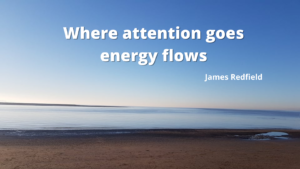What stories are you telling yourself about sleep?
Do you dread going to bed?
Do you find it impossible to switch off?
Do you just know that you will wake in the night and struggle to get back to sleep?
Do you have racing thoughts at bedtime?
There’s a reason many people can’t stop thinking about things before going to bed.
Your brain is collecting new information all day long
According to Jim Kwik in his book ‘Limitless’ we now consume as much data in a single day as the average person from the 15th century would have absorbed in an entire lifetime.
And sometimes it is only when you climb into bed that you have the quiet time to process it all, including any worries you might have.
Anxious thoughts and rumination can also return when you wake up in the middle of the night and a racing mind won’t let you get back to sleep.
Whether you’re stressed, excited, or simply replaying your day, finding ways to help you fall asleep and stay asleep are not only helpful, but vital.
Having a sleep strategy will help you tackle both over-thinking and stressful thinking. Being intentional about sleep, both the quality and quantity you will have is incredibly powerful.
So - prepare to re-write your thinking about sleep.

Setting intentions is the act of stating what you intend to accomplish through your actions.
It's a commitment to what you want the journey to be about.
When you are intentional about something, your focus is in the moment : who you are, what you do, why you do it.
Setting intentions before sleep may influence dream states which helps to reset your system for deeper healing.
A lot of my clients suffer with stress, and I work with them not only to alleviate the symptoms but to root out the cause.
One such client had a very poor sleep routine. She worked long hours and typically got into the zone about midnight, meaning she didn’t get to bed until around 2am. She would typically rise at 11am feeling more than a little groggy.
I asked why she went to bed so late.
She told me she didn’t sleep well and she actually dreaded going to bed.
In her mind, sleep was not something she looked forward to.
Every night as the time to go to bed got nearer, she had the same thoughts “I’m not going to sleep well tonight” “I bet I get woken early by my neighbours” and so on.
It was clear she was already going to bed with intention, but those intentions were entirely negative and were not serving her well at all.
She really wanted to make a change, as her sleep was affecting her work, her energy levels and her personal relationships.
After we had finished working together, the client reported going to bed with far more enthusiasm. The dread had completely gone and she slept so much better.
Here are some of the strategies we put together.
Before sleep:
These are, of course, alongside a good sleep routine, good sleep hygiene, a clutter free space, etc..
-
Invoke more positive thoughts and thinking
The idea is to counter the negative voices.
One way to do this is to make a list of things you’re grateful for before bed. You can do this in your head or on paper, whichever feels best for you.
Feel the energy of this gratitude in your body.
Ask yourself What’s the best thing that happened today? Revel in the memory and say thank you.
This should shift your thinking away from the busy day tomorrow and towards a happier, more relaxed state of mind.
And if you go to sleep happy and relaxed, it is believed your first waking thoughts are more likely to be peaceful and positive.
-
Distract your brain
There will be some evenings where you won’t be able to shake your thoughts at all.
Sometimes, the best you can hope for is to distract your brain with something a bit more positive.

You can practice distraction by making up a story. It can be about anything. Your goals and dreams. Winning the lottery. Going on a luxurious holiday. Meeting the love of your life.
Or you can make a list. I used to do this whilst I was out running. It took me out of my body. Take care this isn’t a to do list as you might find yourself back in the worry zone.
Good list examples might be a list of your favourite movies or songs, or people you would share your lottery win with. Or favourite holidays. Just something to focus your mind elsewhere.
-
Visualization
Visualization is another great sleep aid.
Picture a calm and peaceful spot in your mind’s eye and fill it with specific objects, colours and sounds.
Research* has shown found that people who visualize in detail were able to push unwelcome thoughts more successfully from their minds.
If you have trouble populating the scene, the researchers suggest asking yourself questions about smell, touch and light, such as “Can I feel the sun on my skin? What do I smell in the air?”
You can also visualize your body relaxing, experts say. While breathing deeply and slowly, imagine your breath is a wind coursing through the body, easing stress and relaxing tension as it moves through each part of the body and then escapes.
During sleep:
-
Paradoxical intention therapy
Paradoxical intention is a cognitive technique that consists of persuading a patient to engage in his or her most feared behavior.
Dr. Viktor Frankl, author of Man's Search for Meaning and founder of logotherapy, first coined the term paradoxical intention and defined it as when,
“The patient is encouraged to do, or to wish to happen, the very things he fears..."
This intervention is thought to be suitable for insomnia when there is intense preoccupation about sleep, sleep loss, and its consequences
It is based on the concept that performance anxiety prevents proper sleep.
Paradoxical intention reduces performance anxiety about falling asleep by instructing patients to do the opposite - get into bed and stay awake.
When the individual with insomnia engages in the most feared behaviour, staying awake, performance anxiety related to trying to fall asleep slowly diminishes, and thus he can fall asleep more easily.
-
Shush that chimp
Soothe the chimp brain in the middle of the night.
If you are predisposed to waking in the night, you can be intentional about how you cope with it.
When this used to happen to me, I was at a loss as what to do. It felt like I was drowning in negative thoughts.
Sometimes having an understanding of what is going on biologically can help.
According to Prof Steve Peters, author of ‘The Chimp Paradox’, if you wake during the night, the limbic area of your brain awakens first. This “chimp” brain activates our fight or flight response. Our first thoughts are of our personal security. Where am I? Am I safe? It is only a short while later that the logical, reasoning, “human” part of your brain starts to engage. But by then, your chimp brain can be having a party.
What worked for me was placating my chimp brain, reassuring it, or simply telling it to be quiet. I recognised in the moment that my fears were only in my head. I acknowledged that I couldn’t think rationally in the middle of the night and I intentionally resolved to think through solutions in the morning.
They say it will look better in the morning and there is some truth in that!
These strategies around intention have helped both me and my clients, and it is my sincere hope that they help you too. Give them a try and let me know how you get on.
If you would like to know more about living intentionally, you can book a call with me here.


